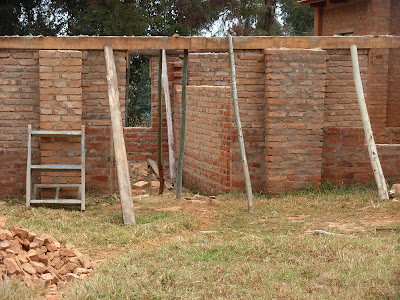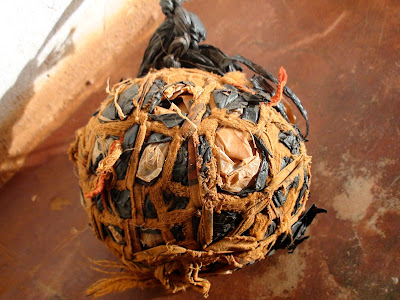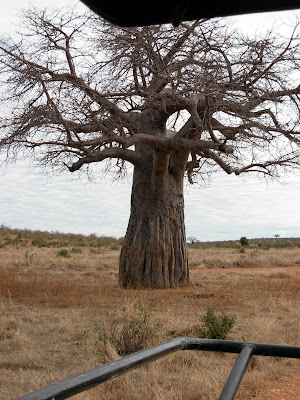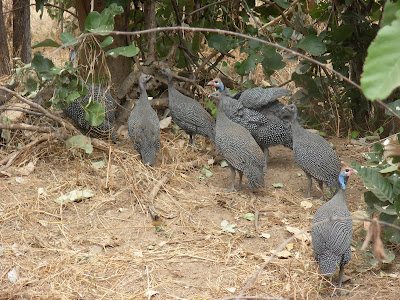Perhaps the most impressive thing about education in rural Africa was the formality in the atmosphere. The whole class always stands as the teacher enters the room, greeting the teacher in unison. Students also stand when called upon to answer questions in class. And each day as I was about to leave the room, the students would recite in unison, "Thank you, teacher, for teaching us. Welcome again!" (The Swahili word for "welcome," karibu, is used very frequently and is used to mean not only "welcome," but also "come" or "come in," as well as "you're welcome" in response to a thank you.)
Play a clip of the students' send-off recitation!
In addition to the classroom formality, I also observed a great deal of respect from student to teacher. Students often addressed the teachers with the word shikamoo, a Swahili greeting that has no literal translation to English but is a respectful greeting for one's elders. The response to shikamoo is marahaba, which basically implies "thank you for your respectful greetings." When a female student says shikamoo, it is often even accompanied by a curtsy.
Students are frequently instructed to complete tasks for the teacher or sent on errands. They are regularly responsible for erasing the chalkboard and for running to retrieve items from the office. Each day, students are also responsible for keeping their schoolyard and schoolrooms clean. They sweep both inside and out (using those tree branches I wrote about yesterday!), and they water the flowers in the courtyard with containers they bring from home.
The respect extends far. I never once witnessed a student disobey a direct order from a teacher, like is all too common here in the United States. Interestingly, the respect didn't seem to really be of the "mutual" sort that has come to be normal in the U.S. The teacher almost never *asks,* but rather commands, a student to do something. The words "please" and "thank you" are not used by the teacher either, though that is partly a societal reflection as those words are much less common in the general language than they are in English, as well. And again, whatever is told of the student is immediately, and without question, done. Furthermore, If a student is in trouble with a teacher for any reason, the student stands in front of the teacher but does not meet the teacher's eye. The student makes no attempt to walk away while being lectured, or even during a long silence, until the teacher specifically dismisses the student.
Although enthralled with the formality and respect, things weren't perfect in the classroom either. What I described as a "buzz of activity" in the classroom on that first day I was there, grew much louder, more frequent, and more distracting by the next week. Attendance and extreme tardiness were issues, and cheating on daily exercises was extremely common. I was paired with a Tanzanian teacher, who was almost always in the room with me, so I was a "guest teacher" and not responsible for the overall running of the classroom.
The biggest frustration for me regarding the less desirable behaviors was that they were usually completely ignored by my co-teacher. He would occasionally tell the students to be quiet, which they would do for a short time, but then the noise level would start to grow again, distracting the students from the exercises they were supposed to be completing. Interestingly, on the few occasions that Edward came to the classroom to visit me, the students were so quiet you could have heard a pin drop! Edward is what we might call a "big potato," a VIP in the community who everyone respects very highly.
As for the attendance and tardiness, I never saw attendance taken. Standard VII actually had about 84 students enrolled, though the typical number in attendance was somewhere around 65 or 70 in the morning and around 50 in the afternoon. According to Edward, however, students were supposed to be present both times (I initially thought that perhaps the afternoon session was optional) and that attendance should have been recorded.
And in a society that is not run by the clock the way America is, I didn't expect minimal tardiness to matter. A "school bell" is rung signaling students that the next class is beginning (they sometimes get a short break between their one-hour class periods as the teachers change rooms), but it's not like American school bells that signal you are late for class even if you arrive just one second after. However, students were sometimes 10 or 15 minutes late to a class period and a half hour or even an hour or more late to the school day. Most of the time, my co-teacher paid no attention to this matter, so I ignored it likewise.
 The "school bell" is actually just the ring of metal pictured above, which is struck
The "school bell" is actually just the ring of metal pictured above, which is struckby a stick from the tree to produce the "bell" noise
The schedule at the primary school changed every day. Though the students always had 5 one-hour class periods every morning and another one-hour class period of English each afternoon, the order of the morning class periods was different depending on the day. This is an intriguing idea because I know even in America it can be frustrating to teach a 1st period class only to have certain students regularly show up late. With a rotation, though, a different subject is taught "1st period" each day, meaning that habitually tardy students don't always miss the same thing.
On Thursday of that first full week, my co-teacher and I had English first at 8 a.m., then math second at 9 a.m. On that particular day, unlike any other time, my co-teacher grew upset with the tardiness. At 8:30, only about half of the enrolled students were there, and he began to lecture the tardy students in groups outside the classroom before allowing them to enter. Finally around 9:00, three boys arrived a whole hour late, escorted by another teacher. They were similarly scolded, and though I had suspected that "punishment" in Tanzania probably didn't mean "detention" the way it would here, I was still unprepared for what followed, as another student was sent to fetch a switch from the office. Each boy received two or three whacks on the backside -- which looked and sounded painful, though in true African way, none of the boys expressed their pain out loud -- before being sent on into the classroom. Interestingly, the tardiness continued every day following that one, and never again was a big deal made of it. What's a person to make of that?
We'll save talk about the cheating for another entry because, a) there's lots more to tell about the actual educational process in rural Tanzania, and b) I should probably get to bed so I can get up in the morning for my first day back at work here. Lala salama! (Sleep well!)






































































